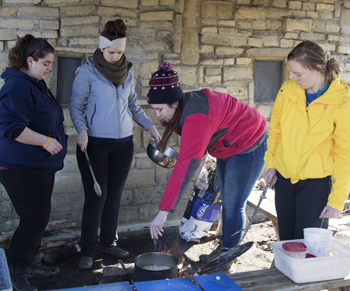Alternative Break Group Simulates Living in Poverty

Mostly, we don’t spend much time thinking about the many pleasures, amenities, and necessities that are usually at our fingertips. Recently a group of six Keene State College students traveled to Heifer International Farm in Rutland, Massachusetts, to learn what it’s like when even such essentials as shelter, food, water, or cooking fuel can’t be taken for granted.
The alternative break program at Keene State College organized the overnight visit to simulate living in poverty. Group leaders and Psychology majors Julia McNamara and Amy Richo both said that volunteering is something that “just comes natural.”
McNamara is a senior at KSC and did her first alternative break trip after hearing about the program through the community service office. McNamara was the president of Keene State’s Big Brothers Big Sisters chapter, which connects young members in the community with college student mentors.
“I may sound really cliché to say why I like volunteering, but I’ve been very privileged with the hand I’ve been dealt, and not many people feel that way. Part of me feels obligated to help people who have not been so privileged in their opportunities. Spending my spare time doing things like Bigs and alternative break just seems like the right thing to do. I feel like I get just as much out of it educationally and self-fulfillment wise as I do giving to other people, so it really is a win-win situation,” McNamara said.
The first day the students learned about such things as consumption, population, hunger, and poverty across the world. The group then did farm chores and clean up, while staying in a log cabin with no electricity or central heat. They cooked a rather meagre dinner over a fire. During the overnight, the simulation even required the students to assume family roles.
“My role was just a regular able-bodied person, one of our group had a baby, one was injured, and one was the only literate one in the family. So that person had the responsibility to read the recipes for the dinner and barter at the market,” McNamara said.
Like McNamara, Richo, a junior, said her favorite part of the simulation was the educational experience that came with it. “Some people live like this every day, and that was theme of the trip. Even though you’re only there for 24 hours, this is a way of life for some people and not just a simulation,” Richo said.
Begin pull-quote…I’ve been very privileged with the hand I’ve been dealt, and not many people feel that way. Part of me feels obligated to help people who have not been so privileged in their opportunities. …end pull-quote
Richo, who has gone on mission trips throughout her high school and college career, said that although she’s volunteered in impoverished areas, she’s never had to live it, which was “really interesting” to her.
“I learn something about myself every time I volunteer, because you’re helping these people. But the people you’re helping are also helping you. You learn new things and experience new things and then get to bring that back to campus,” Richo said.
As a psychology and elementary education major, Richo said that this out-of-the-classroom experience is something she can use when she becomes a teacher. “I’ve always been interested in how I can help the kids, especially when working with impoverished areas,” Richo said. “As a teacher, I always focus on the development, where and how they grew up. I think volunteering will always be a big part of my life along with teaching.”
—by Kendall Pope, a Keene State senior studying Journalism and Public Relations, with a minor in Broadcast Journalism





